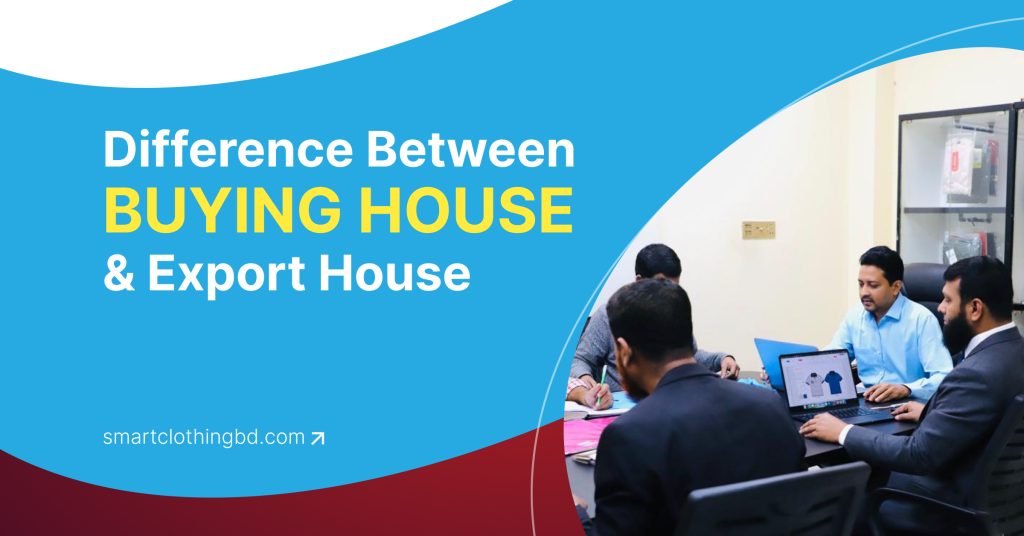
In the realm of international trade, distinguishing between a buying house and an export house can significantly impact business strategies and outcomes. While both entities play pivotal roles in facilitating cross-border transactions, their functions cater to distinct aspects of the supply chain.
Understanding these differences is essential for businesses aiming to optimize sourcing efficiency or expand into new markets. Let’s delve into what sets these entities apart and how each contributes uniquely to the global trade landscape.
What is A Buying House?
A buying house is a company that helps businesses find the products they need from overseas suppliers. They act as a middleman, connecting buyers with manufacturers and suppliers.
What is The Work Of A Buying House?
Here are the major works of a buying house:
- Finding the Perfect Match: They act like super sleuths, searching for the best factories overseas that can create your t-shirts exactly how you envision them, at the best price possible.
- Quality Check Champions: They don’t just find factories, they make sure they’re good ones! They’ll inspect the factories and the t-shirts themselves before they’re shipped, to ensure they meet your high standards.
- Deal-Making Ninjas: Need to get the best price on those t-shirts? Your buying house will use their negotiation skills to fight for the best deal on your behalf.
- Shipping Smooth Sailing: Once the t-shirts are made, your buying house takes care of all the complicated shipping stuff. They’ll make sure your t-shirts get on a ship and arrive at your door safely and on time.
A buying house takes the headache out of finding and buying products overseas. They connect you with the right people, ensure quality, and handle all the logistics, so you can focus on running your business and selling those awesome t-shirts!
What is An Export House?
An export house is a company that specializes in selling and shipping products to buyers in other countries. They work with local manufacturers to export goods abroad.
What is the Work Of A Buying House?
Here’s what export houses typically do:
- Global Matchmaker: They act like international salespeople for your fluffy socks! They’ll connect you with potential buyers in other countries, promoting your socks at trade shows and spreading the word about your amazing product.
- Sales Champions: Once they find interested buyers, your export house takes care of the entire sales process. They’ll handle orders, answer questions, and process payments from international customers, making things smooth and easy for everyone.
- Paperwork Protectors: Exporting socks can involve a ton of documents and regulations. But fear not! Your export house will be your paperwork protector. They’ll handle all the necessary forms, permits, and customs clearances to ensure your fluffy socks can travel the world legally.
- Shipping Stars: Finally, once all the paperwork is in order, your export house swoops in as the shipping stars. They’ll arrange for the most efficient way to get your socks on a ship or plane and deliver them safely to your international buyers.
In essence, an export house is your bridge to the world. They handle all the complexities of international sales and shipping, so you can focus on what you do best – creating the world’s fluffiest alpaca wool socks! With their help, your cozy creations can warm toes all over the globe.
Why This Matters
Understanding the difference between a buying house and an export house is important for businesses involved in international trade. Knowing which type of company to work with can help streamline your operations, save time, and reduce costs.
For Buyers:
Finding reliable suppliers and managing quality control and logistics can be challenging when sourcing products internationally. Working with a buying house can simplify these processes:
- Streamlined Operations: Buying houses specialize in connecting buyers with suitable suppliers, ensuring smoother transactions and reducing sourcing complexities.
- Cost Efficiency: By leveraging their expertise, buyers can save time and costs associated with sourcing and logistics management.
For Sellers:
Expanding into foreign markets requires overcoming various hurdles, from marketing to logistical challenges. Export houses play a crucial role in facilitating this expansion:
- Market Reach: Export houses help sellers penetrate international markets by handling sales, marketing, and distribution.
- Navigating Complexity: They manage export logistics, documentation, and compliance, allowing sellers to focus on production and market expansion.
In conclusion, knowing the subtle differences between buying houses and exporting houses is crucial for businesses in global trade. By picking the right partner—whether it’s a buying house for easier sourcing and logistics or an export house to reach more markets and handle export challenges—businesses can improve efficiency and compete better worldwide. This smart strategy not only saves time and money but also sets businesses up for steady growth in the ever-changing world of international business.